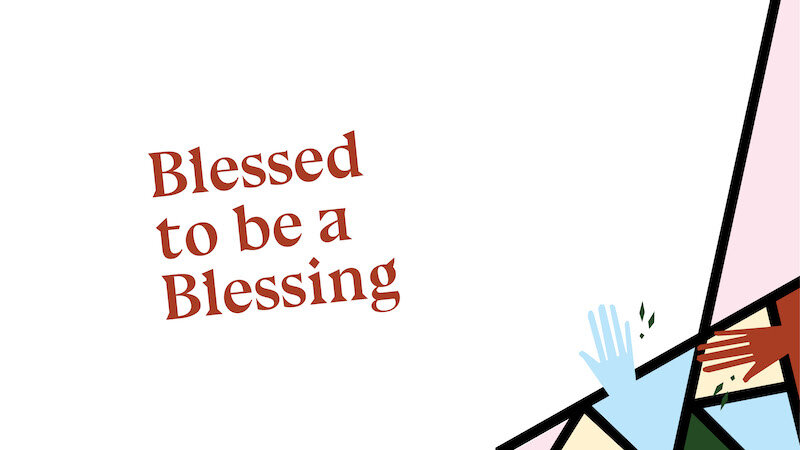Blessed to Be a Blessing | Blessed By Grace
As I was walking our dog this week through the neighborhood I realized something: the communities we find ourselves living in make absolutely no sense. I am not talking about master-planned communities or the unusual way Arlington County decided to name its streets, having 16th Street North dead-end at Glebe Road and then begin again a few blocks later. If you have purchased a home you know the painstaking work necessary to ensure the financial commitment you are making is a solid financial investment for you or your family. Appraisers and home inspectors will do their best (most of the time) to help protect you as the buyer.
What about the neighborhood?
What about the neighbors?
Before you move in, do you know who they are?
Do you know who you will be living next to?
Do you want to live that close to someone you may have nothing in common with except your zip code and tax assessment?
Yeah, you could get a rockstar neighbor like me, who loves to smoke barbecue in the backyard and share it with the block or you could get a dud. The problem is, you do not know until it is too late if you will find yourself feeling blessed to live next to such a great neighbor or if you will be mumbling, “Bless their heart” as you walk from the street to your front door. Being in community with people you cannot identify with or simply do not like is difficult, but for better or worse you may be in that relationship now.
Paul’s audience in Corinth was not sitting around the campfire singing Kumbaya. Paul’s letter to the Corinthians was a letter sent to a church in the midst of division. Paul was writing to a community suffering from mistrust and a lack of unity. Divided along ethnic and social boundaries the Corinthian Church found itself without a clear focus on Christ as their point of unity and the blessing they received through G-d’s Grace.
Differing perspectives and experiences have been causing division within the church since Christ’s ascension. Church conflict is not a modern phenomenon or even a product of the Reformation. Whenever there have been two or three gathered in the name of Christ there has been differing theological opinions, arguments over Church music and Church Council quarrels in basements and something tells me that will not change in the generations to come.
We continue our Blessed to be a Blessing sermon series this morning by considering how we have been blessed by Grace. Grace is one of those “stained-glass” “churchy” words, words you will not hear anywhere except in a religious context, that often goes undefined. The assumption by people like me is that you, the congregation, people with different experiences and journeys up to this point will know what we are talking about.
Since the “fall” of humanity, way back in early chapters of Genesis - when Adam and Eve broke G-d’s one and the only rule and were then removed from the garden - we, humanity, have been in desperate need of the liberating love of G-d. St. Augustine wrote that the Grace of G-d serves as the healer of human nature saying that the church is a hospital full of the sick and it is the Grace of G-d that heals us.
Our Wesleyan heritage as United Methodists takes this a step further noting that the Grace of G-d is prevenient, goes ahead of our conversion and declaration of Christ as Lord and Savior. Before you were baptized as an infant, teenager, or adult, before you prayed the sinner's prayer on a youth retreat, before received your third grade Bible, before took membership vows in a local congregation, or before attended your first Vacation Bible School at your grandparents’ church the unmerited and unwavering love of G-d was and continued to be yours.
We see G-d’s Grace preveniently at work when G-d created the Heavens and the Earth. G-d created all of creation out of love and created us out of Grace, amid Sin (division and exclusion), we as a community of faith rely on the same Grace of G-d that we individually require daily.
Our division places us in need of that which G-d has promised to us through Jesus, the head of the Church.
If you think about it, the community of people we find ourselves with this morning makes less sense than the neighborhoods we find ourselves living in. This morning I will be leading (I lead) a class title Discover Mount Olivet. This is an opportunity for folks who have visited Mount Olivet to learn more about the community before making a commitment and becoming members and learning the nitty-gritty details of the community.
Part of our journey this morning will be (was) to learn what brought each of us to Mount Olivet. Now I arrived here by the Grace of G-d and the appointment of Bishop Sharma Lewis yet what brought me to Mount Olivet is different than what brought you to Mount Olivet and each of us, those of us here in worship and those who will gather (who gathered) for Discover Mount Olivet will have a different story for what brought them to this community. Better yet, each of us has a different story for what has kept us in this community. There are multiple United Methodist Churches throughout Arlington. On Glebe Road alone there are two while on 16th Street, within a mile of one another, there are multiple Protestant churches. So what brought you here and what keeps you here?
At some level, all of us have chosen to be here this morning and to come back week after week. We find ourselves in a community with people who think, dress, behave, and look different from us and still we find ourselves committed to a life together.
We are lawyers and lobbyists, stay at home caregivers, retirees, teachers, and medical professionals. We are Democrats, Republicans, Independents, and more and still, we are committed to a life together with one another, with people whom our friends and family may refer to as “them” or the “other.”
We will pray with them.
We will cry with them.
We will worship with them.
We will serve with them.
If I were to ask each of you your theological position on the Lordship of Jesus, the nature of G-d, or the Bible I am confident the answers would be as would varied and diverse as your own experiences with G-d and G-d’s creation.
We find ourselves on a faith journey together and yet there is no single “right way” for your journey to begin and continue. The single thread holding us together is the Lordship of Jesus and our need of His Grace.
Words like Grace make little sense outside of communities unified in the Lordship of Christ.
Our need for the unmerited love of G-d is the thread that holds us together and we cannot be a community of faith without Christ and His Grace as the center.
We can excel at doing good things for people in need but without the Grace of G-d, we are people trying to be good, knowing (or unknowing) that the good we do cannot repay the Sin humanity has committed against G-d.
Much to our chagrin, this gift of a unified Grace-filled community may seem like the last thing we could want or need and yet, this unmerited gift is a forecast of the Kingdom Christ inaugurated through his own ministry.
The Good News is this - amid division and disagreement we are still the recipients of G-d’s Grace. There is no theological disagreement or division of the Church on socio-economic status, race, political affiliation, or sexual orientation that change the blessing we have received by the Grace of G-d.
Paul continued in his letter to the Corinthians writing that church unity is not a goal or ideal we strive for or will one day live into once we finally get it right (whatever “it” is). The unity of the ancient church in Corinth and for the Church today is found in our unity in Christ and the Grace of G-d that continues to bless each of us.

